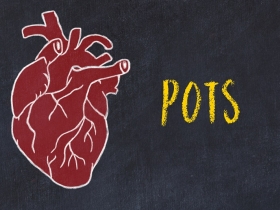What is PoTs and can it impact your chances of having children?
PoTs or Postural tachycardia syndrome is a condition that is more common in women between the ages of fifteen and fifty. You may know someone who has this condition and depending on the person it may or may not impact their daily life. This condition can impact people differently depending on the severity. What exactly is PoTs and can this condition affect your fertility and pregnancy?

What is PoTs?
PoTs is an abnormal increase in heart rate that happens after standing or sitting. This may cause you to feel dizzy or faint. Feeling dizzy or faint from this syndrome occurs from gravity pulling your blood down to your belly, feet, and hands. This causes your blood vessels to narrow and your heart rate to rise. If you have PoTs your autonomic nervous system doesn’t work correctly. This causes your blood supply to your heart and brain to drop when you stand up.
Some people develop PoTs suddenly or it can come on gradually. Some of the symptoms of PoTs include:
- Dizziness or lightheadedness
- Fainting
- Brain fog or trouble with memory
- Weakness and tiredness
- Headaches
- Poor sleep
- Chest pain
- Shortness of breath
Sometimes exercise and heat can make these symptoms worse for some people. If you think you have PoTs you should mention it to your doctor. Not all doctors will think to test for PoTs right away. The tests usually include testing your heart rate and blood pressure with you doing certain activities. [1]
How is PoTs treated?
The treatment for PoTs should be different for everyone. Your treatment plan should be tailored to your needs and symptoms. There is no cure for PoTs, but a certain diet, exercise plan, and medications can help tremendously.
Regarding diet, it is recommended to be very hydrated. If you have PoTs you should drink at least two liters of water a day. You should also eat salty foods to absorb that water. Alcohol can make your symptoms worse if you have PoTs. Caffeine can also have adverse effects on those with PoTs. Your doctor will help you create a diet that will work best for you.
Physical therapy and exercise can be beneficial for those with PoTs. Sometimes PoTs symptoms can worsen with sudden and intense exercise. Physical therapy helps to teach you how to begin exercise slowly and create a higher tolerance for exercise.
There is no one medication that will improve all of your symptoms with PoTs. Usually, doctors will prescribe medication that improves blood volume, helps your kidneys retain sodium, reduce your heart rate, or improves your blood vessel constriction. These are the main focuses of medication for PoTs. There may be some trial and error before you find the right medication. [2]
How does PoTs impact your fertility and pregnancy?
If you have PoTs there is no reason for you to believe that you won’t be able to have children. Some women with PoTs do have added difficulties with conception and pregnancy and some do not. Some women actually have less severe PoTs symptoms during pregnancy and about 30% of women have worsened symptoms.
It is recommended that if you have PoTs you should consider getting pregnant sooner than later. Fetal complications can be more likely if you are above the age of 35. Infertility should not be a huge issue for those with PoTs. If you do have very severe PoTs, when you are pregnant you may be treated as a high-risk pregnancy and be closely monitored. It all depends on your symptoms and current health when you get pregnant. Some medications for PoTs may have to be stopped prior to you trying to get pregnant. If you have PoTs it is important to mention to your doctor your plans for getting pregnant so you can make any necessary preparations. With any condition, pregnancy can seem frightening, but with close communication with your doctors, you will be able to have a successful pregnancy. [3]
Sources:
3 https://dysautonomiainternational.org/blog/wordpress/pots-and-pregnancy-safety-and-other-concerns/






